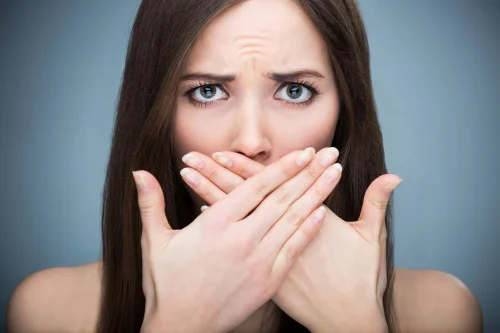Essentially everyone has experienced a sour smell secreting from their mouth. Not only does it leave a yucky taste in your mouth, but it can also be embarrassing when talking to a friend or co-worker. Bad breath happens for various reasons, from diet to serious oral health conditions. Find out common causes of bad breath and how to keep it smelling fresh.
Oral Health: Poor oral health and hygiene typically cause bad breath. Without proper oral hygiene, bacteria from food particles cause plaque to accumulate on the teeth, and bacteria clings to the tongue and tonsils, resulting in funky smelling breath. Certain oral health conditions such as cavities and gum disease are also associated with a sour odor. Remember to visit us semiannually so we can monitor your oral health and give you tips on how to improve it.
Dry Mouth: Ever notice how your breath smells funkier than normal in the morning? Saliva production decreases at night, causing the notorious morning dragon breath. Saliva helps keep the mouth clean naturally by washing away food particles. Most of the time, morning breath foes away after brushing your teeth and drinking water. However, if your bad breath continues into the day, despite drinking an adequate amount of water, schedule a dentist appointment to find an effective solution for your dry mouth.
Flavorful Foods: You are probably well aware that a person’s breath can be a pretty good indicator of what they had for lunch. The smell of garlic, onions, spices, and other flavorful foods can linger in your mouth for hours. These food particles enter the bloodstream and are then carried to the lungs, affecting the smell of your breath every time you breathe out. So, if you are going to a party, you might want to avoid powerful-smelling foods if you want to keep your breath smelling fresh all night.
Coffee Intake: Daily coffee consumers are likely familiar with the stench their favorite espresso leaves behind. Not only is coffee strong in flavor, but it also causes decreased saliva production, which increases bad-breath-causing bacteria. If giving up your favorite espresso is too tall of an order, then try to drink plenty of water afterward and maybe pack some emergency mouthwash in your bag.
Smoking & Tobacco Use: Tobacco products such as cigarettes, chewing tobacco, or pipe tobacco tend to leave a distinct smell after use. Additionally, tobacco users are at an increased risk for gum disease and damage to the gum tissue. Ditching this habit will help keep your breath fresh and your mouth happy.
How to Prevent Bad Breath
- Great Oral Hygiene
- Visit the Dentist Semiannually
- Drink Water Throughout the Day
- Snack on Crunchy Fruits and Vegetables
- Chew Sugar-Free Gum
The first step to preventing bad breath starts with practicing excellent oral hygiene. Brush your teeth twice a day, floss at least once daily, and clean your tongue with either a toothbrush or a tongue scraper. Incorporating mouthwash into your routine can additionally keep your breath fresh by killing bacteria and masking bad breath. Make sure your mouthwash has the ADA seal of approval to receive the full benefits.
Taking measures to increase saliva flow can also help fight against bad breath. Drinking an adequate amount of water can keep your saliva at optimal levels. Crunchy fruits and vegetables, such as apples, and carrots, increase saliva production. Chewing sugar-free gum can also boost saliva flow and keep your breath fresh.
If your bad breath doesn’t seem to cease after making these changes, schedule an appointment with us! We can detect any issues in your oral health that may be causing your bad breath and identify ways to help keep your breath smelling fresh.


